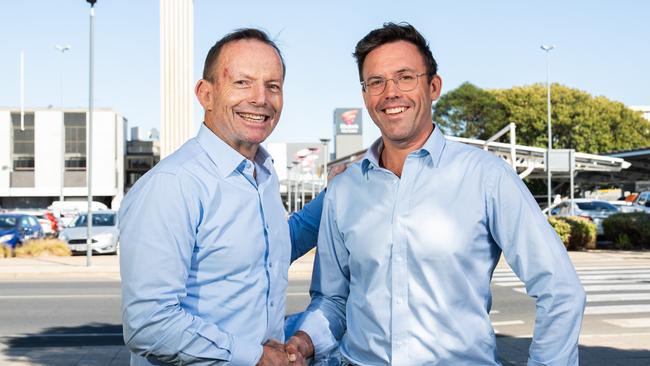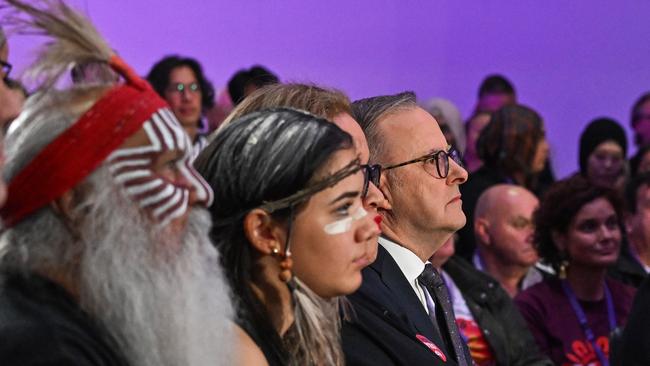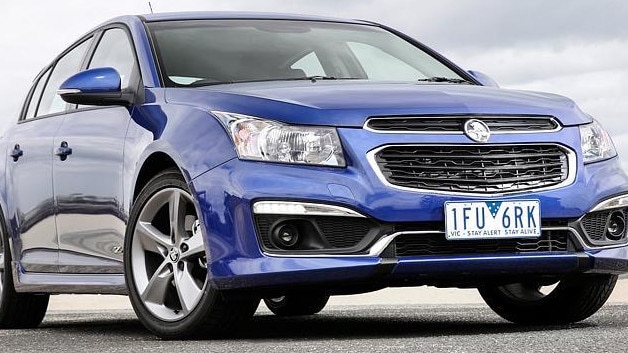This battler seat saw the Yes campaign born, then buried. Could it witness the birth of a Dutton government?
If Tony Abbott is right, and the residents of Adelaide’s gritty north stump for Peter Dutton, the battle will not only be over for the Coalition. The war also will have been won.

The seat of Spence in Adelaide’s gritty north is the place where the Yes campaign for the Indigenous voice to parliament was both born and buried. Two years on and former prime minister Tony Abbott says it’s the place that could witness the birth of a Dutton Coalition government.
As a 12.9 per cent Labor-held seat, Spence is not an electorate that figures on those “seats to watch” lists published during every election campaign. The result in the voice referendum suggests maybe it should be.
The seat, held by Labor MP Matt Burnell since 2022, takes in three key centres in Adelaide’s outer north – the former carmaking hub of Elizabeth, birthplace of Cold Chisel and home to thousands of ten-pound Poms who migrated post-war; the largely impoverished suburbs in and around the Salisbury area; and the pretty northern town of Gawler, its quiet country charms besieged by encircling urban sprawl.

Days after confirming the dates for the 2023 voice referendum, Anthony Albanese travelled to Elizabeth with Indigenous leader and voice co-author Noel Pearson to launch the Yes campaign.
Just weeks later the voice died its most brutal death in Spence, this blue-collar, Labor-to-its-bootstraps electorate junking the idea with a thumping 72 per cent No vote, its most resounding defeat in the land in a state where every single federal electorate voted No.
No wonder – none at all – that in a genuine cost-of-living crisis for the Australian poor, the poorest electorate in suburban Adelaide asked resoundingly whether it had its own voice in Canberra championing its acute economic needs. The result betrayed the common leftist misreading of South Australia as a haven of aesthetes, gourmands and intellectuals, the progressive oasis that led the nation with female suffrage, land rights, alfresco dining and nude bathing.
The reality has always been that SA’s battler community is much bigger than its bourgeoisie.
For every person with a weekend pass to the WOMADelaide festival there are three people in flannies who drive old Commodores, love their footy, drink West End and would happily save the planet if only they could pay their power bill.
This is Spence, where Abbott spent two days this week campaigning with Liberal candidate Daniel Wild, who for the past three years has been a colleague of the former prime minister at the Institute of Public Affairs.

As the man accused of reading the last rites to the Australian car industry and killing Elizabeth’s iconic Holden plant, Abbott argues counterintuitively that the motor vehicle may be Dutton’s swiftest path to victory in Spence.
“Spence is the most car-dependent electorate in the country,” Abbott tells The Australian. “Seventy-two per cent of Spence people drive their car to work, 54 per cent of Spence households have two cars, 20 per cent have three cars, and 98 per cent of these are internal combustion cars.
“Every time the people of Spence fill up their car it will be 14 bucks cheaper thanks to Peter Dutton. I reckon Spence is precisely the electorate which Peter Dutton’s policy should appeal to.
“Spence is the kind of place which has really suffered from the cost-of-living crisis which I reckon is the Labor government’s fault because the government is making it worse.”
Abbott says he can see the signs of a US-style ideological realignment between blue-collar and middle-class, uni-educated Australia, as in the US, where once-Democrat strongholds such as the steel town of Pittsburgh became bulwarks for Donald Trump on his White House return.
The No vote in Spence was a clear-cut example of working people voting in their droves against something that was all the rage at the nicest dinner parties in North Adelaide, where every street had a house with a Climate Action Now poster in the front window.
Abbott says the thing that has struck him most in Spence this week is the lack of small business activity as families struggle to make ends meet and business owners no longer can afford to pay for power.
“There are signs of a shift,” Abbott says. “For a couple of decades now poorer people have been voting more right while richer people have been voting more left because richer people can afford luxury on climate, gender, identity politics and so on.
“Going around different parts of Spence this week – Elizabeth, Salisbury, Gawler – what strikes me particularly in shopping centres is the number of empty shops. Person after person was saying the price of everything was going up. ‘Our mortgage has gone through the roof, our rent is up, grocery bills have gone through the roof’ and obviously power prices. This is where the current government is just putting Band-Aids on bullet wounds.
“It’s all very well saying: ‘We are going to give you a $150 subsidy towards your power price.’ What about changing the policy that’s putting power prices up in the first place, this continual demand that we close down coal and gas-fired power and substitute unreliable wind and solar power?”
As for the voice result, Abbott says he is unclear whether the perception that Albanese became consumed by his passion project still will resonate in Adelaide’s north two years on. But he says he hopes voters realise the same us v them race politics is still being championed by the ALP.
“There should be lingering concerns,” Abbott says. “It was a fundamental misjudgment by the Prime Minister. His concerns are not our concerns. He wanted to divide the country by ancestry. Most of us want to unite our country regardless of people’s ancestry.
“My understanding from last week’s federal budget is that the Albanese government is still putting aside money for treaties and truth-telling. The Malinauskas government here in SA has not abandoned the local Voice that it set up notwithstanding SA’s referendum vote. If you want to stress our nation’s unity and end all this stuff about diversity and difference, which I think is the overwhelming instinct of the Australian people, you’re much better voting for the Coalition.”
As for lingering effects, Abbott says he does not believe his government’s role in the demise of the car industry will damage the Liberal campaign in northern Adelaide. The former prime minister remains a hate figure for some of the local ex-car workers who accuse him and his treasurer, Joe Hockey, of cutting Holden off at the knees by refusing continuing government assistance for the embattled carmaker.
“I certainly did not want the car industry to go,” Abbott insists. “I just thought that the car industry couldn’t demand ever-increasing subsidies every single year. The problem is that with the partial exception of Toyota the big car companies in Australia consistently failed to integrate their local product into their global operations. At the same time, people’s tastes in cars changed. Australians just didn’t want to buy the relatively large six-cylinder family saloons we had traditionally made. That was the difficulty.
“What we need to do now is not cry over spilt milk but ensure that here in this country we have got the policies in place that make us a good place to do business and a good place to make things. That means getting power prices down, connectivity up, ending the red tape and green tape that are strangling development.”
It may sound fanciful. But if Abbott is right, and the battlers of Spence do stump for Dutton, the battle will not only be over for the Coalition, the war also will have been won.




